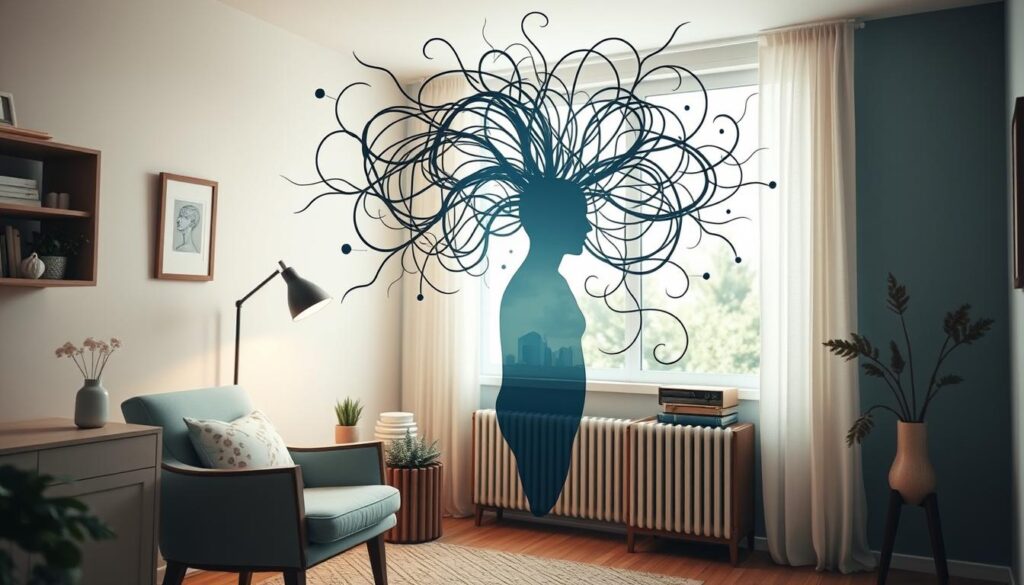Did you know about 40 million adults in the U.S. face anxiety disorders annually? This makes it the country’s most frequent mental health issue. Recognizing anxiety signs and understanding its causes are key. In this discussion, I aim to highlight how anxiety impacts daily lives. It’s vital to know why finding effective anxiety treatments matters.
We will look at what anxiety really is and the common signs that suggest someone might have it. Let’s discuss the reasons behind anxiety disorders and the treatment options available. My goal is to deepen our understanding of anxiety. This will help improve mental health and well-being for all.
Key Takeaways
- Anxiety disorders affect around 40 million adults annually in the U.S.
- Recognizing signs of anxiety is essential for timely intervention.
- Various factors contribute to the development of anxiety, including biological and environmental influences.
- Effective treatment for anxiety includes both therapeutic and medicinal options.
- Understanding anxiety can lead to improved overall mental health.
What is Anxiety?
Anxiety is a natural way our body reacts to stress. It affects how we deal with hard situations. The definition of anxiety covers emotions like worry, fear, and nervousness. When thinking about what is anxiety, we see it in our daily lives. It ranges from feeling uneasy before speaking in public to extreme fear in social events.
Feeling anxious now and then is normal. But, when it messes with everyday life, it’s a problem. This is when we move from common anxiety to clinical anxiety disorders. Regular anxiety might not need a doctor’s help. Yet, clinical disorders made me realize the importance of knowing why it happens and how to treat it.
It’s crucial to recognize the different types of anxiety. Knowing more about it helps us understand our feelings better. And it directs us to seek help if we need it.
Common Signs of Anxiety
Knowing how to spot anxiety signs is key. It’s useful to group these signs into two types: emotional and physical. This helps us understand how anxiety affects us every day.
Emotional Signs
Emotional symptoms of anxiety pack a big punch. Many people report feeling:
- Excessive worrying about different parts of their lives, leading to negative thoughts.
- Restlessness, which makes staying calm or still a challenge.
- Irritability, causing trouble in friendships or at work.
Physical Symptoms
Physical signs of anxiety show up in many forms. Spotting these early is key. Here are some common ones:
| Physical Symptom |
Description |
| Increased heart rate |
A fast heartbeat can happen during stress or panic. |
| Sweating |
Too much sweating, even when not moving or in a cool place. |
| Muscle tension |
This is when muscles feel tight or hurt because of stress over time. |
Causes of Anxiety Disorders
It’s important to understand the causes of anxiety. We need to look at biological, genetic, and environmental triggers. Each plays a key role in affecting someone’s mental health.
Biological Factors
Biological aspects include things like neurochemical imbalances and how the brain is built. Serotonin and dopamine are chemicals that help control our mood. If they’re off, it can lead to anxiety. Studies show that the amygdala, a part of the brain, is linked to anxiety.
Genetic Influences
Genes play a part in anxiety, too. Anxiety disorders often run in families. This suggests a genetic piece to the puzzle. If your family member has anxiety, you might be more likely to have it as well. It’s the mix of genes that decides how we deal with stress.
Environmental Triggers
Things that happen to us can trigger anxiety. This includes trauma or big changes in life. Losing someone close or facing abuse can push someone into anxiety. Knowing these triggers helps in finding ways to cope.
| Cause |
Description |
| Biological Factors |
Neurochemical imbalances and brain structure affecting mood regulation. |
| Genetic Influences |
Hereditary factors that predispose individuals to anxiety disorders. |
| Environmental Triggers |
Traumatic experiences and significant life changes that can initiate anxiety symptoms. |
Different Types of Anxiety Disorders
Knowing about different anxiety disorders can help me spot symptoms and get the right help. Each disorder impacts people in its own way. I’ll talk about three common types: Generalized Anxiety Disorder (GAD), Panic Disorder, and Social Anxiety Disorder.
Generalized Anxiety Disorder (GAD)
Generalized Anxiety Disorder means I worry a lot about daily stuff. This worry is so big, it affects how I live. Symptoms include feeling restless, getting tired easily, hard time focusing, feeling irritable, and trouble sleeping. These worries are bigger than they should be, making me feel really stressed.
Panic Disorder
Panic Disorder happens when I get sudden, scary panic attacks. During these, I might feel my heart beat fast, have trouble breathing, feel dizzy, or think something awful is about to happen. These strong fears can make me avoid places where I’ve had attacks before. It really impacts my day-to-day life.
Social Anxiety Disorder
Social Anxiety Disorder means I’m super scared of social events. I worry a lot about what others think of me or messing up in front of people. It leads to physical signs like sweating, shaking, or feeling sick to my stomach. This fear makes it hard for me to join in, hurting my social life and friendships.

| Type of Disorder |
Key Characteristics |
Symptoms |
| Generalized Anxiety Disorder |
Chronic worrying about various life aspects |
Restlessness, fatigue, irritability, sleep issues |
| Panic Disorder |
Recurrent unexpected panic attacks |
Rapid heart rate, shortness of breath, dizziness |
| Social Anxiety Disorder |
Intense fear of social situations |
Trembling, sweating, upset stomach, fear of judgment |
How Anxiety Affects Daily Life
Anxiety changes how we handle daily tasks, making simple things feel hard. It can lead to fewer social interactions, leaving one feeling lonely. Keeping up with friends and family becomes a struggle as they may not get what you’re going through.
At work, anxiety can lower your performance. It makes focusing hard and fills you with self-doubt, hurting your productivity. I’ve seen how it turns easy tasks into huge hurdles. This worsens work stress, increasing overall anxiety.
Anxiety really affects one’s quality of life. People often stay away from things that make them anxious. This holds back both personal and professional development. It might feel like there’s no way out of this cycle.
To start changing things, recognizing the impact of anxiety is crucial. Looking for help and learning how to deal is key. While tackling anxiety takes time, each step towards dealing with it can make a big difference in happiness.
Diagnosis of Anxiety Disorders
Understanding the diagnosis of anxiety disorders can seem tough at first. It’s key to know that both pro checks and self-tests are important. A full check-up can clear the way to know if it’s really an anxiety disorder. Let’s take a look at these evaluations.
Professional Assessment
Seeing a mental health pro for anxiety starts with a deep look at your situation. They will talk about what you’re feeling, your past, and your family’s health history. They might use special questionnaires and follow the DSM-5 guide to get a clear picture. This careful step makes sure they know exactly what’s going on and how to help.
Self-Assessment Tools
Trying a self-check for anxiety might be a good first step. The internet has plenty of these tests. They have easy questions to see how you’re doing and how bad your symptoms are. Even though they don’t take the place of seeing a pro, they are a good start. Knowing your own situation helps when you talk to a doctor about it.

| Assessment Type |
Description |
Purpose |
| Professional Assessment |
A detailed evaluation by a licensed mental health provider. |
To provide an accurate anxiety disorder diagnosis and recommend tailored treatment. |
| Self-Assessment Tools |
Questionnaires that individuals can fill out to evaluate their anxiety levels. |
To help individuals understand their anxiety challenges before seeking professional help. |
Treatment Options for Anxiety
Learning about treatments for anxiety puts me in charge of my mental health. There are many types of help, from seeing a therapist to trying new, natural remedies. Here’s a look at different ways to tackle anxiety, including talking to professionals, taking medicine, and other unique methods.
Therapeutic Approaches
Cognitive-behavioral therapy (CBT) really stands out for anxiety relief. It helps change the bad thoughts and actions causing stress. Exposure therapy, on the other hand, makes you face what scares you little by little. This can reduce fear and stop you from avoiding things. Group therapy offers strong support by sharing experiences and learning from others.
Medication Options
For serious anxiety, medication might be the answer. SSRIs are often used to improve mood. However, benzodiazepines are only used for short bursts because they can be addictive. It’s best to talk to a doctor to figure out which medicine is right for you. They’ll help you understand the good and the bad.
Alternative Treatments
There are also interesting non-traditional treatments for anxiety. Herbal options like chamomile or valerian root can calm you down. Practices like mindfulness and yoga help with relaxation and lowering stress. Acupuncture is thought to fix imbalances in your body’s energy. These methods could work well with more typical treatments.
Managing Anxiety in Daily Life
Finding ways to manage anxiety improves life every day. I found that lifestyle changes, practicing mindfulness, and having support helps a lot.
Lifestyle Changes
Making daily habit changes helps a lot with anxiety. Here are some changes that worked for me:
- Nutrition: A balanced diet of whole foods boosts mood and energy.
- Exercise: Working out releases endorphins, making us feel less anxious.
- Sleep: Getting enough sleep regularly helps in handling stress better.
Mindfulness and Relaxation Techniques
Adding mindfulness to my day has been a big help. Here are some simple practices:
- Deep Breathing: Focusing on breathing helps me feel grounded.
- Meditation: Meditating clears my mind and brings peace.
- Yoga: Yoga helps me relax by merging movement and mindfulness.
Support Networks
Having people who support you is key in managing anxiety. I found support in:
- Friends and Family: Talking with loved ones makes me feel connected.
- Support Groups: Groups and online communities offer a place to share and learn.

When to Seek Professional Help
Knowing when to seek help for anxiety is crucial for mental health. Certain signs suggest it’s time to think about getting professional help. If anxiety overwhelms me and disrupts my daily life, I should consider talking to a therapist.
Some common indicators include:
- Struggling to manage anxiety symptoms on my own.
- Feeling hopeless or overly worried.
- Having constant headaches or stomach issues.
- Feeling intense discomfort or fear in social settings.
Recognizing when to see a therapist brings many benefits. Getting help early can offer effective ways to cope. This can help me understand my feelings better and stop anxiety from getting worse.
Seeking help for anxiety shows strength, not weakness. Knowing professional support is out there can give me the courage to improve. With a skilled therapist, I can learn how to manage my anxiety. If you’re struggling too, think about getting support.
| Signs to Seek Help |
Possible Benefits |
| Persistent anxiety symptoms |
Enhanced coping strategies |
| Impact on daily activities |
Improved quality of life |
| Feeling overwhelmed |
Greater emotional strength |
| Physical health issues |
Increased wellbeing |
Conclusion
Reflecting on anxiety shows how important it is to recognize its signs and understand its causes. By breaking down its complexities, we can turn big challenges into small, manageable steps. This helps people manage their feelings better.
There are many treatments for anxiety, including therapy, medicines, and natural remedies. It’s important to find the right one for you. Getting better often means changing your lifestyle, learning to relax, and having a support network.
To better manage anxiety, it’s key to take active steps. I urge everyone to learn more, try helpful activities, and connect with experts and support groups. Each action we take brings us closer to a balanced and healthy life.
FAQ
What are the signs of anxiety?
Emotional symptoms of anxiety include feelings like worrying too much, feeling restless, and getting easily upset. On the physical side, look out for a faster heartbeat, sweating, and tense muscles. Knowing these signs can help spot anxiety in yourself or in someone else.
What causes anxiety disorders?
Anxiety disorders come from a mix of bodily, genetic, and external reasons. They can stem from the way our brains handle chemicals, our family’s health history, and big stresses in life.
How can I manage my anxiety in daily life?
To handle anxiety, try eating better and moving more. Also, practice calming your mind through meditation and deep breaths. Having close friends and family to talk to is key to managing anxiety well.
When should I seek professional help for anxiety?
It’s time to get help if anxiety takes over your life and stops you from doing everyday things. Signs that you need help include constant worry, struggling in social or work settings, and thinking about harming yourself. Getting help early can make a big difference.
What types of treatment options are available for anxiety?
There are many treatments for anxiety. This includes talking therapies like CBT, medicines such as SSRIs, and natural methods like herbs and acupuncture. Knowing your options helps you make the best choices for your mental health.
Can anxiety be treated without medication?
Absolutely, anxiety can be managed without drugs. Things like mindfulness, being active, and talking to a professional can really help reduce anxiety symptoms for a lot of people.
What should I expect during a professional assessment for anxiety?
A mental health specialist will do a thorough check when you go for an anxiety assessment. They’ll ask about how you’re feeling, your family’s mental health, and any major stresses. You might also answer some questionnaires to figure out how severe your anxiety is.
What are the different types of anxiety disorders?
Common anxiety disorders include Generalized Anxiety Disorder, where you worry all the time; Panic Disorder, marked by sudden panic attacks; and Social Anxiety Disorder, which means extreme fear of being around people. Each has specific symptoms and needs its own treatment approach.